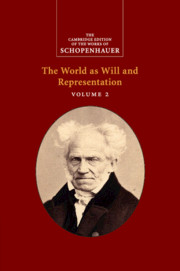Chapter 33 - Isolated Remarks Concerning Natural Beauty
Published online by Cambridge University Press: 30 June 2022
Summary
What contributes to making the sight of a beautiful landscape so utterly delightful is, among other things, the thoroughgoing truth and consistency of nature. Of course, nature does not follow the guidance of logic in the sequence of grounds of cognition, antecedent and consequent clauses, premises and conclusions; but it does follow the analogous guidance of the law of causality in the visible connection of causes and effects. Every time an object is modified, however slightly, with respect to position, diminution, concealment, distancing, lighting, or linear or atmospheric perspective, etc., this modification is infallibly registered and taken into account quite precisely through its effect on the eye: this bears out the Indian saying ‘every kernel of rice has a shadow’. Everything here displays itself with such complete conviction, such strict adherence to law, such consistent and scrupulous accuracy: there are no dodgy tricks here. Now if we consider the sight of a beautiful view merely as a phenomenon of the brain, then it alone, of all the complicated brain phenomena, is completely regular, flawless and perfect, and all others, and in particular our own operations of thought, are more or less afflicted, either formally or materially, with defects and flaws. This advantage accruing to the sight of natural beauty explains both its impression of harmony and complete satisfaction, as well as the positive effect it has on the whole of our thinking which, in its formal aspect, becomes disposed to greater accuracy and becomes to a certain extent clarified, because that one completely flawless brain phenomenon puts the brain in general into a fully normal action, and, now that nature has given it the proper impetus, thought itself attempts to follow that method of nature in the consistency, coherence, regularity and harmony of all its processes. A beautiful view is therefore a catharsis of the spirit, in the same way that music, according to Aristotle is a catharsis of the feelings, and in its presence we think with the greatest accuracy. –
The sudden sight of a mountain range quickly puts us into a serious, even sublime mood, an experience which may in part be due to the fact that the form of the mountains and the contour of the mountain range it helps define is the only permanent line of landscape, since only mountains defy the decay that quickly sweeps away everything else, and in particular our own ephemeral person.
- Type
- Chapter
- Information
- Schopenhauer: The World as Will and Representation , pp. 420 - 422Publisher: Cambridge University PressPrint publication year: 2018



